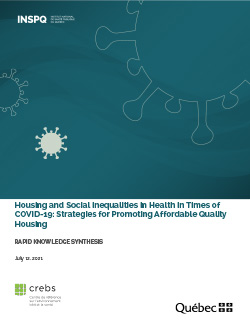Housing and Social Inequalities in Health in Times of COVID-19: Strategies for Promoting Affordable Quality Housing
The COVID-19 pandemic and the preventive and control measures put in place to protect against the associated health risk have highlighted existing social inequalities in health. The population was asked to spend more time at home to minimize the risk of coming into contact with the virus, which prompted the scientific community to examine the impact of housing conditions during the health crisis. Thus, it was observed that:
- Housing, including its surrounding environment, is an important determinant of health, wellbeing and quality of life;
- Living in unhealthy, unsafe or overcrowded housing can have negative effects on physical and mental health, especially during periods of confinement;
- Safe and healthy housing can act as a protective factor against the transmission of COVID-19;
- Disadvantaged populations that are less well housed are less well protected from COVID-19 during periods of confinement;
- During the COVID-19 pandemic, social inequalities in housing have intensified: disadvantaged populations are more likely to be poorly housed and it has become more difficult for them to access quality housing;
- The economic impact of the pandemic is reducing access to quality housing, particularly for large families and disadvantaged households;
- In the short term and during a pandemic, providing emergency assistance to households in precarious housing situations can reduce housing instability. This can be done in particular by alleviating or allowing the deferral of financial obligations related to housing and by minimizing the number of eviction orders attributable to overdue rents;
- In the medium term, it is necessary to increase access to quality housing so as to better protect the population from COVID-19 and other contagious infections. Several strategies can be employed, including increasing the supply of safe and healthy housing, developing complete living environments and implementing mechanisms that result in a sustainable supply of affordable housing;
- It is important to better document the characteristics of the housing stock to improve understanding of its impacts on the health of the Québec population, both when COVID-19 is prevalent and over the longer term;
- Investing in social and community housing is a strategy that allows many housing issues to be addressed in a sustainable manner.

Author(s):
Committee:
Subject(s):
Publication type:
ISBN (electronic):
978-2-550-91590-4
Post date:
April-05-22